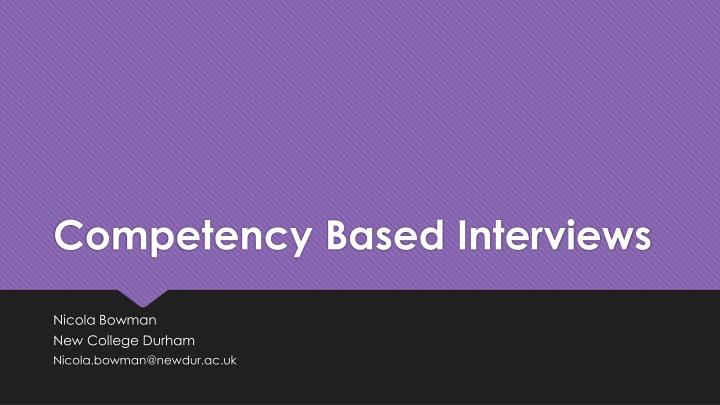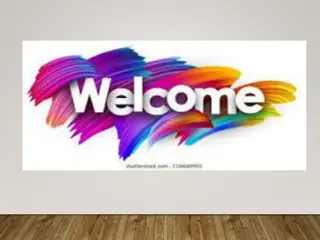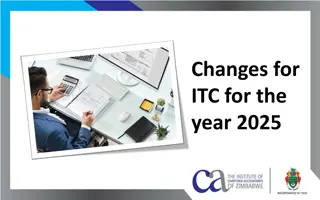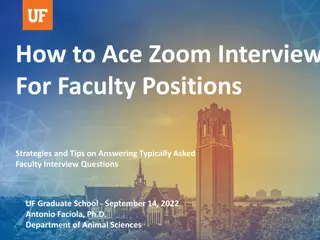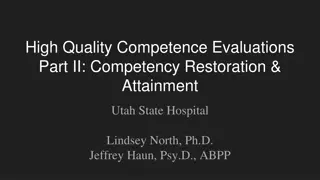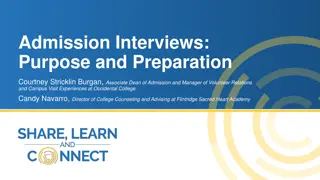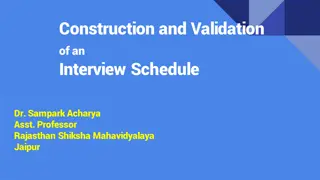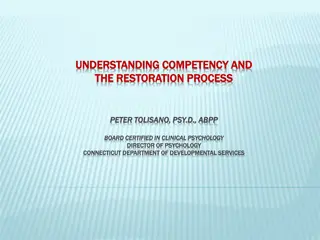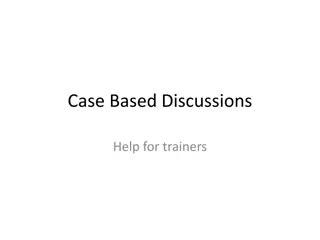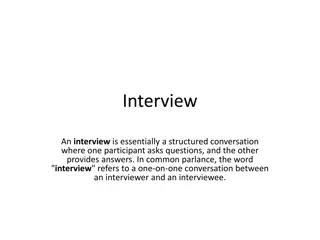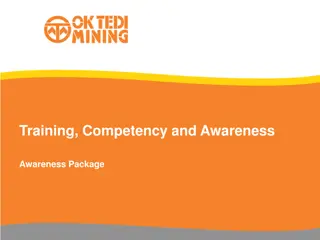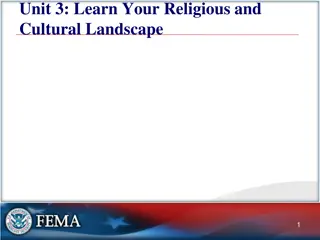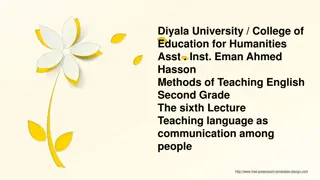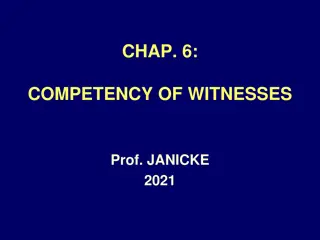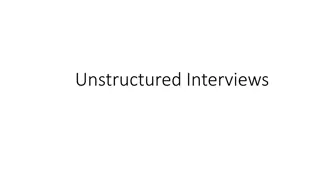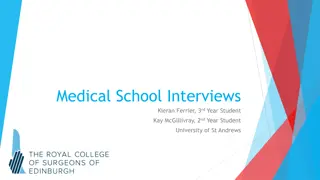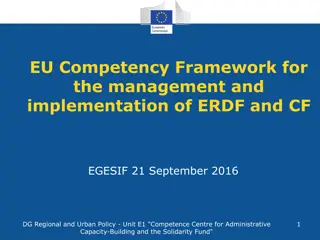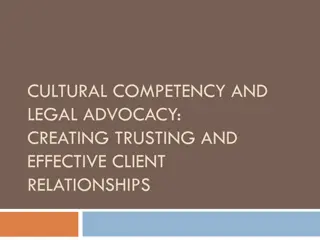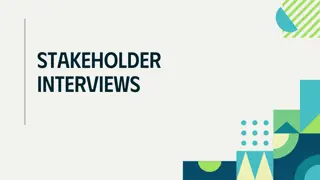Competency Based Interviews
Learn about competency based interviews, differences from traditional interviews, preparation tips, and assessment methods. Understand key competencies, strengths, weaknesses, and the importance of competencies in the workplace.
Download Presentation

Please find below an Image/Link to download the presentation.
The content on the website is provided AS IS for your information and personal use only. It may not be sold, licensed, or shared on other websites without obtaining consent from the author.If you encounter any issues during the download, it is possible that the publisher has removed the file from their server.
You are allowed to download the files provided on this website for personal or commercial use, subject to the condition that they are used lawfully. All files are the property of their respective owners.
The content on the website is provided AS IS for your information and personal use only. It may not be sold, licensed, or shared on other websites without obtaining consent from the author.
E N D
Presentation Transcript
Competency Based Interviews Nicola Bowman New College Durham Nicola.bowman@newdur.ac.uk
Objectives To Understand: The differences between a traditional interview and competency based interview How you can prepare for the competency based interview The assessment during the competency based interview
Semi-Structured Interview Static list of questions Same questions for each candidate Relate to job role/person specification Linked to previous experience Could be linked to hypothetical situations
What are competencies? Key Competencies: Qualities that an employer has decided are essential or desirable for the job Personal attributes or behaviours of an individual eg problem solving Competencies are used to rate and evaluate candidates Linked to performance expectations individual and organisational performance
Strengths and Weaknesses Strengths: Clear well-defined set of behaviours Linked to recruitment and appraisal system Transferable skills Processes are measurable Weaknesses: Focus on past Creates clones
Competency Based Interviews Standard questions linked to reliability Most effective method of selection interview Compliments assessment centre exercise and psychometric tests Increases validity of the selection process Candidate provides evidence for level of competence Focuses of 4-6 competences
Competencies Activity Make a list of at least four competencies you think are important in the workplace.
Competencies Commercial Awareness Communication Computer Skills Emotional intelligence Creativity Customer Care Enterprise and Entrepreneurial skills Problem Solving Resilience Team Work/ Management
Preparation for the Interview Researching the role and what it entails Predict key competencies for the role Skills/experience deemed essential is often linked with key competencies Think about evidence required for each competency Practice and learn the answers Skill set will be similar for similar roles Stay calm
Preparation for the Interview Have a look at the job description provided Identify at least four different key competencies that you could predict being covered during the interview
Which competencies? Team Work Communication Emotional Intelligence Adaptable Business Awareness Team Management Customer Service Creative
Example Competency Based Questions Describe a time when effective timemanagementskills were the key to success. Tell me when you had to manage or resolve a conflict between two or more co- workers. Discuss an experience where you have explained complicated technical terms to colleagues or customers without the same knowledge as yourself? Communication When have you needed to solve a problem using abstract, lateral thinking? Describe a project that you have been involved in that required input from people at different levels within an organization. Team working Describe a situation where you said or did something that had a positive impact on an team worker? Emotional Intelligence.
Probing Questions Give me an example of where a strict, challenging deadline had to be met What needed to be achieved? How much time was provided? How strict was the deadline? What made the deadline challenging? How did you meet the deadline/why did you not meet the deadline? What was the result? What was the quality of the work produced within the deadline?
STAR Method S Situation Setting the Scene T Task what to achieve, goals set and desired outcome A Action what course of action taken and why R - Result outcome of actions highlight success or failure
Applying the STAR Method Tell me about a time in which you were required to produce something to a high standard, within a fixed period of time. Situation during my management programme I conducted a management project on leadership styles and staff within my team took part in this research. Task in order to carry out this project and achieve a high grade, I was required to conduct high quality research over a 6 month period within the organisation. I was working full-time as a manager during this time and worked towards achieving a 70% distinction grade. Action to help me complete a high quality project, I attended all the workshops that were delivered on this module and also spoken to my supervisor at regular intervals. I sent the questionnaires out as a pilot study to ensure that the project would meet the requirements. Result getting the questionnaires back was challenging and working full time, however I managed to present my project to my lecturer at the given date/time and I achieved a mark of 80% which was great. The project also enabled the team to look at leadership styles and employee engagement which has also improved working practices in the organisation.
Example Questions Describe a time when effective time management skills were the key to success. Tell me when you had to manage or resolve a conflict between two or more co-workers. Describe a situation in which the cause of a problem was not initially clear. When have you needed to solve a problem using abstract, lateral thinking?
Activity In pairs, pick one of the questions from the list and apply the STAR model: Situation Task Action Result Draft answers to this question using the STAR method.
Assessment during the interview Performance Indicators: Arrived on time/with time to spare Was dressed appropriately for the interview setting Showed evidence of knowledge of the role Brought CV/letter/application form. Negative indicators: Arrived late Did not show evidence of preparation or research Candidate was anxious and unconfident The candidate was dismissive to the interviewer The body language and eye contact was inattentive.
Interview Scoring Booklet Give me an example of where a you had to meet a tight, challenging deadline. Probing Questions Evidence: What did you need to achieve? How much time were you provided with? Why was the deadline challenging? What did you do to meet the deadline? If you didn t meet the deadline, why not? What was the outcome of the task? How successful were you in completing the task? What was the quality of the task?
Summary Standard questions linked to reliability Most effective method of selection interview Compliments assessment centre exercise and psychometric tests Increases validity of the selection process Candidate provides evidence for level of competence Focuses of 4-6 competences
